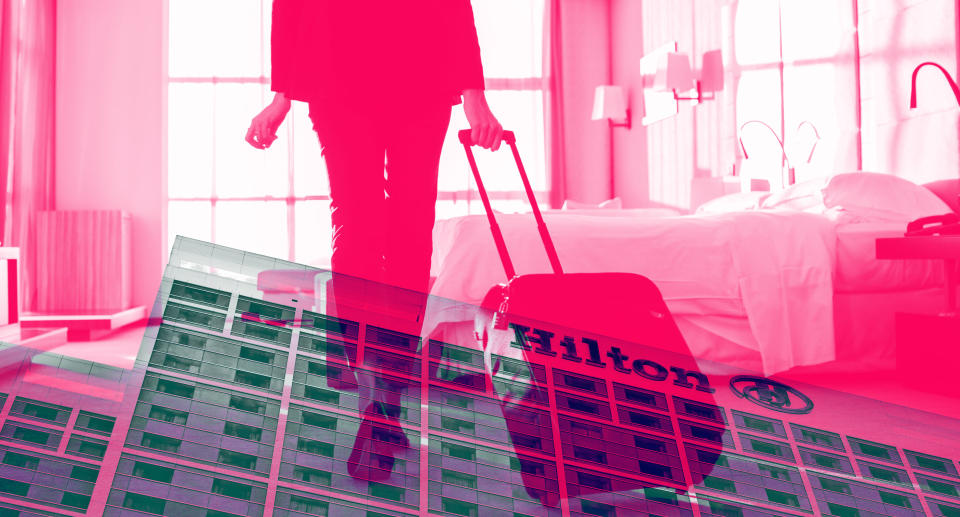Survey named Hilton the best place to work for women. We found out why.

Kathy Heneghan started as an administrative assistant at Hilton in 1989. Since then, she’s risen through the ranks — holding positions in sales, events and food and beverage. Now, 30 years later, she’s still working at the hotel chain, serving as the general manager at the Embassy Suites by Hilton Chicago Downtown Magnificent Mile. Henegan, who went from booking meetings to leading 150 employees at a 455-room hotel, credits “encouragement within the organization from other females” for elevating her career to such heights.
Heneghan’s experience is just one example of what makes the hospitality business so successful — and why it was recently named the No. 1 Best Workplace for Women 2019.
The ranking comes from a study conducted by culture experts Great Place to Work and Fortune, and is based on a 60-question survey that was completed by more than 4.6 million employees across the U.S. The inquiries focused on various work environment factors, such as whether or not women were treated as fairly as men, if female workers were respected equally no matter what the role, and what the ability was to reach human potential both inside and outside of the workplace.

Where Hilton truly excels is putting into practice the philosophy that people, no matter their gender, will be better employees if their employer values their happiness and humanity outside of the office just as much as their at-work productivity.
Laura Fuentes, Hilton’s chief talent officer and a MAKERS@ board member, understands that innately. “If our team members don’t feel supported through the moments in their lives that matter, they can’t bring their best selves to work,” says the mom of two. “We know that, as humans, that’s just a fundamental reality.”

Hilton has succeeded at humanizing the work environment by offering programs that make employees’ lives easier — such as 12 weeks paid leave for birth mothers, free shipping of breast milk home for parents on the road, and up to $10,000 in adoption assistance (per child).
The company also aims to address the obstacles women face in moving upwards, and eliminating factors that motivate them to leave the workforce. Female managers quit their jobs at twice the rate of men, with C-Suite women exiting at four times the rate of their male counterparts, according to research done by the Network of Executive Women (NEW).
Lack of flexibility is one of the main reasons women cite for leaving the workforce, which is why Hilton makes adjustability a priority. “I have a lot of flexibility in when and how and where I work,” Fuentes says, adding that this policy has been instrumental in helping her balance parenthood and executive life.
And it goes beyond the C-Suite, with hourly workers benefiting from this progressive approach, too. “We put that flexibility into scheduling. They can get their schedules at least 10 days in advance, which is a rarity in service work,” Fuentes adds. The maternity coverage extends to the entire company, as well. “We didn’t want to have a program for executives and then a different program for housekeepers, so we give all of our team members the same parental leave from C-Suite to our housekeepers to our front desk agents,” Fuentes says.

That’s been huge for Ashley Zimmerman, a veteran and Military Programs Associate at Hilton who has been integral in helping the company hire more than 30,000 veterans and spouses. She cites adjustability as a huge part of why she’s been able to do her job while also being a mom and military spouse. “My son is in kindergarten, he just started school this year, and their schedule is only half days from 10:30am to 2:30pm. I’m always like, ‘How would anyone be able to manage this without having some flexibility? It’s right in the middle of the day,’” Zimmerman, who works remotely, says. “There’s just no way I could balance that if I was working for another company.”
Another perk, the Business Immersion Program, requires senior leadership to spend three days working onsite at a hotel property. Fuentes calls that experience integral to her understanding of the company, and says it informed her of everything from what type of uniforms employees wear to the layout of break rooms. “I did housekeeping shifts and front desk shifts, and server shifts, I spent some time with the general manager,” Fuentes says. “I never doubted for a moment that these jobs were hard, but doing it yourself ... It gives you a newfound perspective.”

Although some companies regard employees’ happiness as an afterthought, Hilton considers it a business imperative. “There’s a miscalculation that spending on your employees is a cost-line item; it really is an investment-line item,” says Fuentes. “Invest in your greatest asset and make sure they’re engaged and productive. When your team members feel welcomed and included and listened to and taken care of, that’s how they’re going to make [Hilton] guests feel. They’re going to bring their best selves to work.”

By putting women and parents first, Hilton is not only setting an example for other companies, but making a difference in individual lives. “It’s the constant encouragement to make sure that women are really moving forward in their careers within Hilton,” Heneghan says. “Coming up through the path that I did has helped me see how my progress is helping other women know that they can also progress.”
Editor’s Note: Hilton is a member of the MAKERS@ partnership program.

